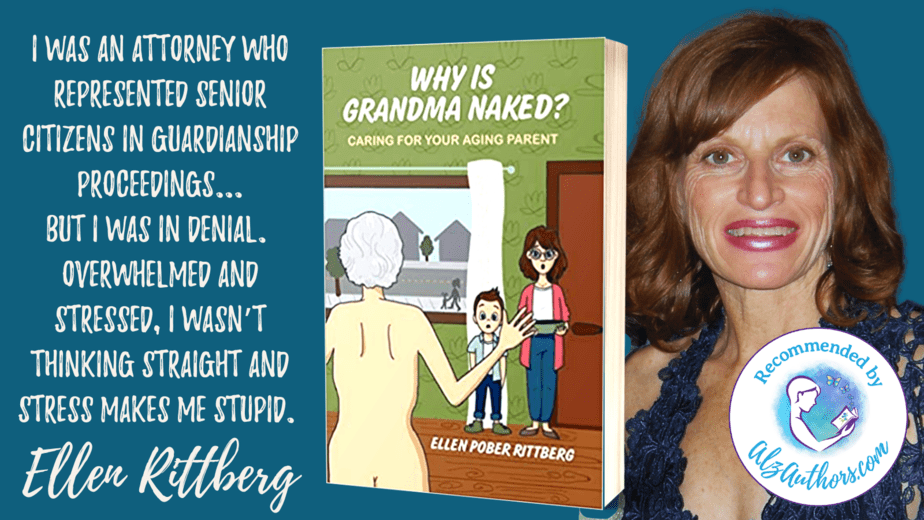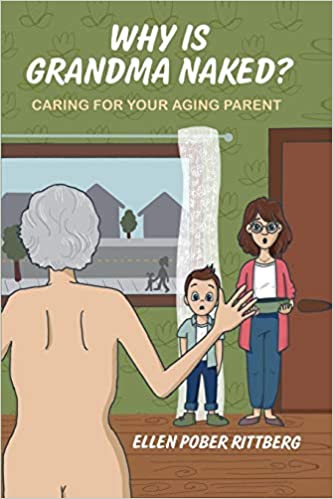Looking back, I wonder why it took so long for me to recognize that my mother had dementia. Mom had been a dignified, serious, independent three-books-a-week reader who hated asking anyone for anything. Through time, she morphed into The New Mom. She’d summon me to come watch what struck her as hilarious: the Progressive Insurance commercial lady. And I asked myself, shouldn’t I have figured it out sooner? I was an attorney who represented senior citizens in guardianship proceedings and wrote reports and recommendations for judges. But now, I know why: I was in denial. Overwhelmed and stressed, I wasn’t thinking straight and stress makes me stupid. Notwithstanding this, during those six years of being a caregiver, I managed to develop some really good, practical and funny coping mechanisms that worked. Then I discovered that there were next-to-no humorous, how-to books for caregivers whose parents have dementia, which led to my writing Why is Grandma Naked? Caring for Your Aging Parent. It’s my hope that by sharing what worked for me, the book can help other caregivers and lighten their load, so to speak. I describe from A to Z the most important issues and scenarios readers will encounter. And since I know caregivers are pressed for time, I made it 113 pages with many short chapters, making it a pretty fast read. (Myself, I’m convinced I have the attention span of a flea.). The most important takeaway is, you can do this difficult thing and give your parents the best life they can have, given their dementia.
Still, I sometimes ask myself why I didn’t recognize Mom’s dementia earlier. What did I think Mom’s sudden resistance to my persistent requests to go to the bathroom until it became too urgent to heed the call was? Delayed teenage rebelliousness? (Don’t look it up. I made that syndrome up.) In my book, I walk the reader through the stages of incontinence with humor. Yes! It is possible to approach this topic with humor and specificity.
Or what did I think caused Mom to drive at night to the local CVS even though we agreed she wouldn’t, leading me to track her down like a combination bloodhound/bounty hunter? (And, no, it was not the merchandise.) And why did I buy into Mom’s farfetched explanations for the many dings and dents on her car that made it resemble a Picasso sculpture? Was I just plain old gullible? (Don’t answer that, please.) One of my chapters is about when it may be time to take away the car keys.
Another reason I didn’t recognize the dementia earlier was, I was operating in panic/survival mode, which is never a great mode to be in, a/k/a chicken-without-the-head mode. For far too long, I tried to do everything myself and I tell the reader, “Don’t!” I tell it straight: even if you could, “You’re not good at everything. No one is.” And why would you? At the end of a day, most caregivers are energy-overtaxed and emotionally sapped. So I emphasize the importance of asking for help from others early and often and of the need to develop a support system. It’s crucial. I’ve been there. Done that. After a long work commute, shopping on the way home, cooking diner and chatting with Mom, and then jogging in place–there was no time to go to the gym–while watching Jeopardy! and Wheel of Fortune with Mom (and hoping my thumping wouldn’t set Mom off–thankfully, it didn’t. She was hard of hearing– I’d flop into bed at nine p.m. like some overtired, overwrought toddler. (And by the way, I’ve got an excellent flopping technique in case anyone is interested. Maybe I should patent it. Hmmm.) .
And I very specifically, and with many examples, share how humor helped: After I showered Mom for the first time (which was the first time I’d ever seen her naked) instead of being horrified or cringing —okay, fine. There may have been a little bit of that—I had a silly reckoning: Despite having been a gym rat for much of my adult life, I realized I’d probably end up looking just like her if I was blessed to live as long as she had—Mom died at age 95. And then I laughed heartily at that sobering realization!
Another funny coping technique I describe: Mom loved recounting whole plots of books to me, chapter by chapter, scene by scene, in excruciatingly detailed detail. To prevent myself from falling into what I call the Adult Zombie Mode, I developed a whole set of head bobs and nods to disguise that I was only partially listening. Another technique: if all else fails, you can compare your own experiences to your parents’, and put a funny spin on it. After listening to Mom’s repeat stories about her very active dating history when men fell at her feet, I thought about my own non-existent dating history. Specifically, the only men who ever fell at my feet were men who may have passed out for reasons entirely unrelated to me.
And of course, there’s the title of my book: Why is Grandma Naked? One day while sitting in front of Mom’s large picture window overlooking a busy street, Mom got up and began taking off her clothes. I quickly closed the curtains and chuckled heartily after getting over the initial shock of it (not, however, before stupidly asking her why she did that. Which I don’t recommend asking.) Laughing helped. Greatly.
What I didn’t understand until after the fact was that being a caregiver for a beloved parent with dementia is like dementia: it‘s irreversible and life-transforming. And whenever I think of Mom, I still smile.

Bio:
Ellen Pober Rittberg is an award-winning journalist, attorney and essayist. Her most recent humorous how-to book is Why is Grandma Naked? Caring for Your Aging Parent. Her parenting humor book, 35 Things Your Teen Won’t Tell You, So I Will, is based upon having three close-in- age children and surviving with her sanity largely intact. For several years, she hosted and produced a live award-winning cable television show, The Changing Family. Her essays and features have appeared in the New York Times, Newsday, NY Daily News, HuffPost, Readers Digest and other large platforms. She lectures and facilitates discussions about caregiving and parenting in public venues, and before Covid, on cruise ships. Her poetry book, He is Walking Wider, has just been published by Kelsay Books.
Ellen’s website: https://ellenrittberg.com
Link to purchase the book on Amazon: https://amzn.to/2VY6F4x
Social media:
Instagram https://www.instagram.com/ellenrittberg/
Twitter https://twitter.com/ellen_rittberg
Facebook https://www.facebook.com/ellenrittbergauthor
LinkedIn: https://www.linkedin.com/in/ellen-pober-rittberg-3a747510/




2 Responses
This is a must read for adult children, close relatives or friends of people who are aging , and those who, hopefully, will get old. Most everyone! The information is engaging, spiked with lots of compassionate humor , and is extremely timely as life expectancy increases, and more of us and our loved ones will need help navigating everyday life.
Thanks so much for your kind words. I hope my book lightens people’s loads and they can be prepared or relate to what I experienced! Laughter always helps!